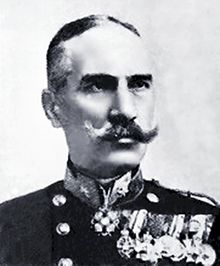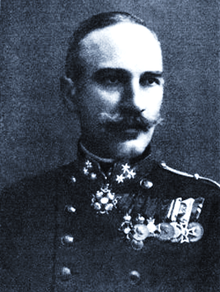Eduard Fischer (General)
Eduard Fischer (born January 18, 1862 in Carapciu , Bukowina , † June 21, 1935 in Vienna ) was an imperial and royal major general of the gendarmerie, who headed the Austrian police in the Duchy of Bukowina and Galicia, as well as the Knight of Theresa . He was also a respected author .
biography
Years of development
Eduard was born the son of a small landowner. Even as a little boy he raved about being a soldier. After completing the sixth grade of high school, he voluntarily joined the ranks of his home infantry regiment No. 41, came to the infantry cadet school in Lobzow near Cracow , which he graduated with excellent results in 1885 and became a lieutenant in 1888 . In 1891 he was accepted into the state of the kk gendarmerie. On May 1, 1895 he was first lieutenant and supplementary commander for Czernowitz, on May 1, 1900 Rittmeister 2nd class, a year later that 1st class and commander of the gendarmerie department No. 1 in the city as well as deputy of the state gendarmerie commander for the Bukovina. In 1906 he was appointed head of a commission for the study of the gendarmerie in Hungary, Germany, Belgium and Switzerland by the Ministry of War. The quality of the rich material laid down in an extensive report prompted the emperor to award him the Knight's Cross of the Imperial Austrian Order of Franz Joseph in 1907 for his excellent work . On May 1, 1912, he was promoted to major and regional gendarmerie commander and was awarded the Imperial and Royal Military Merit Cross .
In the first World War
With the outbreak of the First World War, he advanced to lieutenant colonel on August 1, 1914 . After Russian troops attacked Bukovina at the end of August and the country's capital fell into their hands within a month, Fischer formed an armed Bukovinian people's uprising, which he led. This people's army not only included gendarmerie units, but also numerous volunteers of various ethnicities and professions. The main bases of the resistance were in Gura Humorului and Câmpulung Moldovenesc . Fischer's troops not only repelled the Russian attack, but even briefly conquered Czernowitz until the Tsarist troops under General Andrei Selivanov occupied the city again on November 20, 1914.
In September with the order of the Iron Crown 3rd class with the war decoration (KD.) Was awarded, then on October 27th of the year already in addition to the rank tour to the colonel . The chairman Nikolaus Ritter von Wassilko sent an extremely appreciative telegram to Fischer on behalf of the Ukrainian members of the state parliament and imperial council in Bucovina, in which he is called "an extraordinary child" of the Bukovina. During a private audience with Emperor Franz Joseph I on January 16, 1915, he was highly praised by him and on April 1 of that year he was honored with the Knight's Cross of the Austrian Leopold Order with War Decoration (KD.) . He also received a saber of honor from the citizens of the city of Chernivtsi (October 20, 1915, given not until October 25, 1917 because of the war events).
How had managed with less than 10 000 troops since the war began Fischer, the elite troops of Generals Brusilov , Russkji , Ivanov to hold and Evreinow for months at bay, was a very special performance. To deceive the actual number of troops, he used firecrackers instead of cannons and ratchets instead of machine guns as a background noise. At the end of August 1914, he liberated the state capital from the tsarist army. Grand Duke Nikolai Nikolayevich offered a reward of 100,000 rubles on his head. This act had made him famous among friends and enemies and Sven Hedin , who visited him during the war in Bukovina, called him "Andreas Hofer of the East".
On February 1, 1918 (rank of March 17 of the year) the commander of the regional gendarmerie command No. 13 advanced to major general, and on March 20, Emperor Karl I appointed him gendarmerie commander for Galicia and Bukovina.
In the months of March to November 1918 he also made a contribution to the food supply of Vienna.
The author
Fischer also made a name for himself in the scholarly world through his literary and scientific work. His writings on Bukovina and Moldova generated great interest, especially in Romania. For his services he was honored around 1900 by the University of Chernivtsi with a doctorate in philosophy honoris causa and also earned him the gold medal for art and science (1898).
epilogue

As Romania's war opponent in the meantime , the defender of Bukovina, General Fischer, became baron von Flondor on November 25, 1918 on the orders of the later long-time mayor of Chernivtsi , appointed by the Romanians in Bukovina as defense minister , Nikolaus Baron von Flondor - who in contrast to Alexander von Hormuzaki , the last governor of Bukovina , had broken his oath on the emperor - arrested and taken to Iași . He and his wife were interned in a camp near the Moldovan capital in early 1919, where they both contracted a serious infection, from which the woman died. He was released to Austria in 1920.
In his 193rd doctorate on October 25, 1927, he was subsequently awarded the Military Maria Theresa Order for his outstanding achievements as a lieutenant colonel in 1914 . Shortly before that, he had been paralyzed on one side from a stroke .
Sometime in the course of his life the general converted to Catholicism , probably between 1908 and 1911, when numerous Orthodox and Protestant Christians, but also Jews and Muslims, because of the 60th jubilee of the throne or the emperor's 80th birthday “in honor of the Kaisers ”. Both the memorial stone on his honorary grave at Hietzinger Friedhof and the picture of the laying out of the body document this fact.
Works
Eduard Fischer several historical-geographical works, including:
- "Local Studies for Middle Schools", Verlag H. Pardini, Czernowitz 1893
- "The Bukowina, a general local lore", (also: "Große Heimatkunde der Bukowina") Editura H. Pardini, Czernowitz 1899, 344 pp.
- "Writings on the history of Bukovina and Moldau" (Romanian: "Scrieri privind istoria Bucovinei și Moldovei"), Chernivtsi 1899
- "On the coinage of the Principality of Moldova", Verlag H. Pardini, Chernivtsi 1901
- "Kosmin" (Romanian: "Bătălia din Codrii Cosminului: Războiul dintre Ştefan cel Mare şi Regele polon Ioan Albert în anul 1497", translation by Ion Strişcă), Editura Institutul de Arte Grafice "Eminescu", Bucharest 1904, 67 pp. And maps .
- "The Wehrmacht of the Moldau under Stefan the Great", yearbook of the Bukowin State Museum 1905–1906, Chernivtsi 1906
- Map of Bukovina 1: 150,000 in three languages (German, Romanian, Ruthenian)
- "War without an army: My defense of Bukovina against the Russians", Verlag Franz Schubert, Josef Lenobel, Vienna 1935 ISBN 0-01-146151-9
Individual evidence
- ↑ Bukowinaer Rundschau No. 3308, from Tuesday, May 1, 1900, p. 3
- ↑ a b Czernowitzer Allgemeine Zeitung No. 180, from Thursday, March 21, 1918, p. 1,2
- ^ Pester Lloyd, Budapest, Sunday, March 3, 1918, p. 3
- ^ Press and Information Service: "Rathaus-Korrespondenz", June 18, 1960, January 17, 1962, Vienna
- ↑ Dr. Sophie A. Welisch: The History of Bukovina (PART II: THE AUSTRIAN PERIOD 1775-1918) . Bukovina Society of the Americas. March 2002. Archived from the original on September 23, 2015. Info: The archive link was inserted automatically and has not yet been checked. Please check the original and archive link according to the instructions and then remove this notice. Retrieved May 25, 2015.
- ↑ Vorarlberger Volksblatt No. 84, from Wednesday, November 4, 1914, p. 3
- ↑ Czernowitzer Allgemeine Zeitung No. 56, from Friday, October 26, 1917, p. 3
- ↑ Neue Freie Presse No. 24188, from Saturday, January 20, 1932, p. 7
- ↑ Neue Freie Presse No. 25423, from Saturday, June 22, 1935, p. 5
- ^ Antonio Schmidt-Brentano: "The kk or kuk Generalität 1816–1918", Austrian State Archives, Vienna 2007, p. 46
- ↑ Fischer, Eduard. In: Austrian Biographical Lexicon 1815–1950 (ÖBL). Volume 1, Verlag der Österreichischen Akademie der Wissenschaften, Vienna 1957, p. 321.
- ^ Die Neue Zeitung No. 317, of Tuesday, November 17, 1914, p. 5
- ↑ (News) Welt sheet No. 270, from Tuesday, November 26, 1918, p. 5
- ^ Austro-Hungarian Army - Military Maria Theresia Order . Retrieved May 25, 2015.
- ↑ Fischer's tomb in Hietzing
- ↑ Kurt Scharr: "The Bukowina Landscape - The Becoming of a Region on the Periphery 1774-1918", Verlag Böhlau GmbH, Vienna, Munich 2010, p. 113
literature
- Mariana Hausleitner: "The Romanization of Bukovina: The implementation of the nation-state claim of Greater Romania 1918-1944", Verlag Oldenbourg Wissenschaftsverlag, Munich 2001
Web links
| personal data | |
|---|---|
| SURNAME | Fischer, Eduard |
| BRIEF DESCRIPTION | Austro-Hungarian major general and writer |
| DATE OF BIRTH | January 18, 1862 |
| PLACE OF BIRTH | Carapciu , Bucovina |
| DATE OF DEATH | June 21, 1935 |
| Place of death | Vienna |






